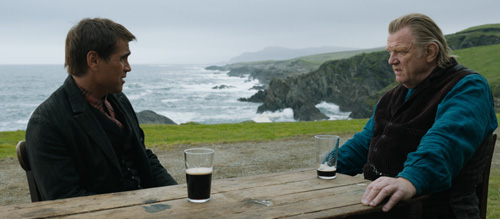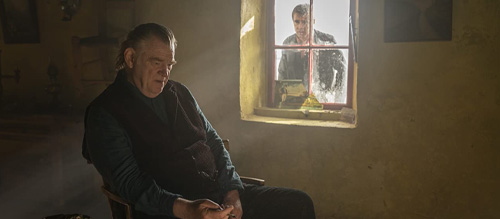The Banshees of Inisherin (2022)
Director: Martin McDonagh
Screenwriter: Martin McDonagh
Starring: Colin Farrell, Brendan Gleeson, Kerry Condon, Barry Keoghan, Pat Shortt, Gary Lydon, David Pearse, Sheila Flitton, Bríd Ní Neachtain
Writer-director Martin McDonagh is well known for his darkly humorous ruminations on life. His work across the three feature films prior to his latest release has seemed like an exercise in how dark his stories can be, and how flawed and problematic his characters can get, whilst still making each of us laugh and cry. The filmmaker, known primarily as a playwright prior to his directorial debut in 2008, deserves plaudits for consistently opening up topics less discussed in the modern cinematic sphere of bland but widely enjoyed vehicles created more to protect investments and underwrite failed business ventures than to pursue any kind of human truth. The Banshees of Inisherin, McDonagh’s fourth feature film, is presented with all of what we’ve come to expect from this filmmaker’s unique filmic voice, this time the barrel of his lens pointed directly at the relationship between masculinity and mental health. This isn’t as jaw-droppingly funny as In Bruges, nor as universally accessible as Three Billboards Outside Ebbing, Missouri, yet it may be the best Martin McDonagh film released to date.
Foregoing the confines of a direct-to-awards-season story like that of his 7-time Oscar-nominated film Three Billboards, McDonagh returns to what he knows and presents most effectively: men talking to and about men. Colin Farrell stars as a proud nice guy who lives for the simple pleasures, with his In Bruges cohort Brendan Gleeson starring as his less-than-impressed artist friend looking for more from his life than meaningless interactions with his “boring” friend. Living in a small community on the island of Inisherin just off the coast of civil war-era Ireland in the 1920s, there’s not much to do besides spend time with one another, and so one man’s choice to terminate a friendship comes with a series of consequences that are at once farcical and deeply upsetting.
McDonagh’s writing is, as always, sharp and witty at a surface-level glance, the laughs barrelling from scene to scene once the film establishes its tone in the first act. His work with dialogue is particularly strong, the two-time Best Screenplay BAFTA winner showcasing his ability to express a wide range of character emotions through the withdrawn language of your typical man’s man. As was the case with In Bruges particularly, there is so much to be said between the lines that each actor reads, though the lines sure are poetic in their own idiosyncratic ways. Beneath the surface, at a structural level, The Banshees of Inisherin plays as dark as any McDonagh film, and is perhaps even more haunting. It’s as if the island itself is plagued by understated manisms, the very real consequences of refusing to talk or to seek help hanging over every scene. As one man’s hurt is passed to the next, we witness the men and women fall under a cloak of darkness. Pain, McDonagh suggests, is contagious.
It’s a story as operatic as any put to screen in the past ten years, its almost inevitable escalation of tragic personal events playing like a small town, small issues version of Darren Aronofsky’s Requiem for a Dream, only with more personality. To present such a story with so many moments to laugh at really is a brave filmmaking choice, albeit one McDonagh takes time and time again, and to do so effectively is to cast the correct actors. Perhaps that’s why McDonagh turned to regulars Colin Farrell and Brendan Gleeson to shoulder the vast majority of the responsibility.

Colin Farrell is having a particularly memorable year, his contributions to both The Batman and After Yang have been positively received, but Banshees is no doubt his most layered and outstanding piece of acting in 2022. As simple but nice Pádraic Súilleabháin, he excels in earning puppy dog-eyed sympathy, his comic physicality escalating the laughs but always leaning just the right side of cartoonish. He’s a stellar marksman, perhaps the only one capable of bringing this character to life in such a believable way, and under the guidance of his director he finds someone worth rooting for. His is a character arc wrought with sadness, and the weight of that sadness certainly comes to bear in each element of his performance. His soft voice is replaced with a drone, his worried expressions with blank glass-eyed stares, his nervously lifted shoulders with a wide gate. It is Colin Farrell’s film on the screen, his steady hand guiding us through the depths of McDonagh’s work.
Brendan Gleeson as Colm is similarly as effective, though less present. His eyes tell the whole story, though at moments he brings you close as he motions to speak but no words come out. He is big, strong, and seemingly at one with himself, but he is played as if unsure, and is no doubt lonely, gifting us our most poignant interaction with the relationship between mental health and masculinity.
Other cast members are effective for lighting up scenes with titbits of comedy to latch onto and identify with, but it’s in the dual performances of Kerry Condon as Pádraic’s sister Siobhan and Barry Keoghan as the town’s police officer’s son Dominic that confirm the outstanding quality of this ensemble. Condon, as Siobhan, seems strong and capable if not uncomfortable, but as the film rolls on we see her struggle with her loneliness, responsibility and all that the town’s men bring into her life. Keoghan has a more dynamic arc, his character rapidly receding from boisterous comic relief to perhaps the darkest of them all, the actor fusing his character with signs of trauma even as he plays up to the laughs, the maturity of his performance certainly worth a mountain of plaudits.
The Banshees of Inisherin is an ensemble hit for McDonagh, then – another film in his relatively short catalogue that showcases his talent as a director of actors. With dialogue this strong and a story so deeply rooted in its intentions to unpack serious and dark topics, McDonagh’s ability to develop such an exceptional level of performances from his cast expresses his outstanding abilities across the board. Were Banshees to be more outgoing in its cinematographic style as In Bruges was, or as quick to take off narratively as Seven Psychopaths was, perhaps we would be discussing the next audience-pleasing indie box office hit. As it is, The Banshees of Inisherin is stronger for its lack of these things, both the almost photographic style of cinematography and slow-burn narrative providing the most moving result. This isn’t cinema that will wow in every screengrab or provide a dopamine-hitting sensory overload, it’s meaningful, moving cinema that speaks a truth about masculinity and depression that few filmmakers have been able to so succinctly thread into their work.
The Banshees of Inisherin is an operatic screen fable that needs to be experienced. To those willing to surrender to its intentions, to read more deeply into its presentation than to simply enjoy its jokes, this Martin McDonagh film will strike you as meaningful, artistic and powerful. This is the type of film that will bleed into the darker parts of your brain and take up residence there, committing you to deeper questions about yourself and your relationship to your mental health.
Score: 23/24


